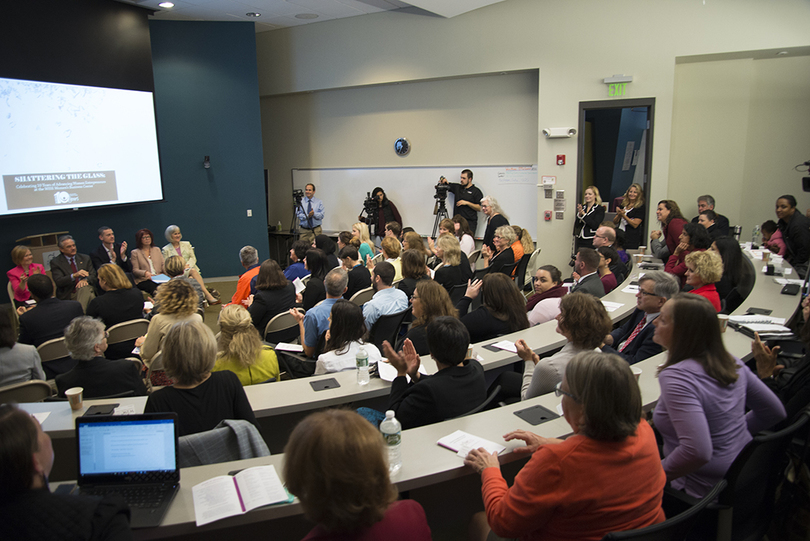WISE Women’s Business Center celebrates 10th anniversary

Colin Davy | Staff Photographer
The WISE Women’s Business Center offers resources, counseling, mentorship and workshops to encourage women to pursue entrepreneurship.
The WISE Women’s Business Center is celebrating 10 years of supporting female entrepreneurship.
The center, hosted by Syracuse University’s Martin J. Whitman School of Management, provides resources, counseling, mentorship and workshops. It is one of at least 105 women’s business centers nationwide, said Joanne Lenweaver, director of the WBC, although not all of them are named Women Igniting the Spirit of Entrepreneurship. A celebratory event was held at the center’s office in the Tech Garden in downtown Syracuse on Monday.
Lenweaver said the WBC served 125 clients last year and they made more than $47 million. Nevertheless, she also said success for a female entrepreneur might not always be about making money.
“Our major goal may not be each one of these clients to make a hundred million dollars next year,” Lenweaver said. “What we are doing is allowing them the space to say, ‘You know what, you are able to begin this business, you will seek personal satisfaction from it.’”
The need for a center came about 15 years ago, Lenweaver said, when a group of people created the first WISE Symposium, a daylong conference for female entrepreneurs. After a few years, people began to say they were excited to grow their business but didn’t know how, she said.
Whitman, which hosted the symposium, applied for a grant from the United States Small Business Administration in 2006 and the WBC was created, Lenweaver said. Each year, the WBC has to apply for the grant again, she said.
One of the biggest changes the center has seen over the years has been its location. The WBC was originally located in the South Side Innovation Center, Lenweaver said, but it was hard to gain visibility. The WBC moved to its current location at the Tech Garden in 2012, she said, where it is much more visible and easily accessible by public transportation.
“In this building, there are a lot of people that are very much in the technology world,” Lenweaver said, “and I think that women are not as exposed to technology as they could be, and so I think that this is a terrific atmosphere for women to be, you know, mingling with others.”
MaryAnn Monforte, an accounting professor in Whitman and member of the WBC advisory board, said for the three years she has been on the board, she has seen increased involvement. Over the years, the WBC has helped more than 8,000 clients and put in more than 5,000 hours of service, she said.
Tracy Hogarth, a client of the WBC, said one of the main benefits she has received from the center is that she can connect with other women, who understand juggling being an entrepreneur and wife with a full-time job.
“I think that’s one of the benefits of working with an incubator — you get to work with other female entrepreneurs,” Hogarth said. “You get referrals, there’s kind of like a ‘You scratch my back, I scratch your back.”
Hogarth created her business, Blue Zaria, after the death of her daughter. To deal with her grief, Hogarth took a trip to Puerto Rico, where she realized travel was a place for her to rejuvenate and heal, she said. Hogarth realized other women would be interested in taking trips as well, and with that, Blue Zaria was born as a travel-curating company for women.
The center has helped Hogarth focus on long-range planning for her business, moving it beyond just day-to-day or monthly planning, she said.
As for plans for the WBC’s future, Lenweaver and Monforte both said they hope to increase funding. Monforte said while the Small Business Administration gives funds to the WBC, the WBC has to also be able to match them. She said she hopes the center can have more self-sustaining funding so it will be able to provide for businesses for years to come.
The center also hopes to hire more business counselors, Lenweaver said, so it can serve a higher demand of women.
Monforte said entrepreneurship is only going to get bigger, which is why so many universities across the country are looking to offer entrepreneurship programs. Centers like the WBC are needed, she said, because women need support to take their ideas to the next level, which in turn also grows the economy and provides employment.
“It really doesn’t benefit only women,” Monforte said. “It truly benefits the community as a whole.”




